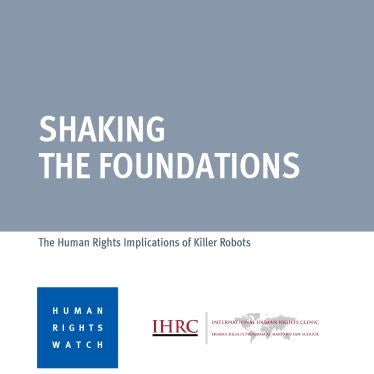(Washington, DC) – The Obama administration’s commitment to stop using antipersonnel landmines anywhere in the world except in the Korean Peninsula is a positive step, but doesn’t go far enough to join the Mine Ban Treaty, Human Rights Watch said today.
Today’s announcement came on the 20th anniversary of President Bill Clinton’s speech to the United Nations General Assembly, when he became the first world leader to call for the “eventual elimination” of antipersonnel mines.
“It’s good that the Obama administration is inching toward joining the Mine Ban Treaty, but Korean civilians need protections from these weapons just as much as the people in every other country,” said Steve Goose, arms director at Human Rights Watch and chair of the United States Campaign to Ban Landmines. “A geographic exception to the ban is no more acceptable today than when the treaty was negotiated.”
Under the new policy, the US will not use antipersonnel mines outside the Korean Peninsula and commits to “continue our diligent efforts to pursue material and operational solutions that would be compliant with and ultimately allow us to accede” to the Mine Ban Treaty, also known as the Ottawa Convention.
The US tried to get an exception for Korea during the Mine Ban Treaty negotiations in 1997 and was strongly rebuffed by its allies. Numerous retired US military officers, including those who commanded forces in Korea, have said that using antipersonnel mines there is of little or no military value.
On June 27, 2014, the US announced a ban on US production of antipersonnel landmines and committed not to acquire or replace stockpiled mines “as they expire in the coming years.” That policy announcement did not preclude the US from using its stockpile of 3 million self-destructing antipersonnel mines anywhere in the world.
US officials have indicated that the new landmine policy does not represent the final outcome of the landmine policy review initiated by the Obama administration in 2009. The US Defense Department is continuing to study the potential impact of signing the treaty, including by finding alternatives to self-destructing antipersonnel mines, which are prohibited by the treaty.
A total of 162 nations have signed the 1997 Mine Ban Treaty, which comprehensively bans antipersonnel landmines and requires their clearance and assistance to victims. The Clinton administration in 1997 set the objective of joining the treaty in 2006, but the Bush administration reversed course in 2004.
Human Rights Watch is a founding member of the International Campaign to Ban Landmines (ICBL) and chairs the US Campaign to Ban Landmines, a coalition of more than 400 nongovernmental organizations. The ICBL received the 1997 Nobel Peace Prize, together with its coordinator, Jody Williams, for its efforts to bring about the Mine Ban Treaty and for its contributions to a new international diplomacy based on humanitarian imperatives.








